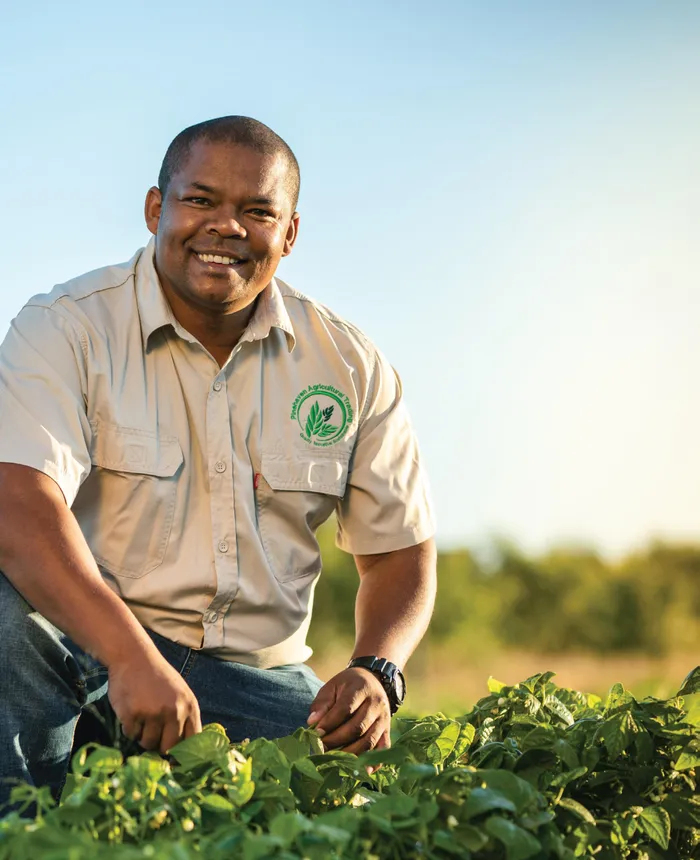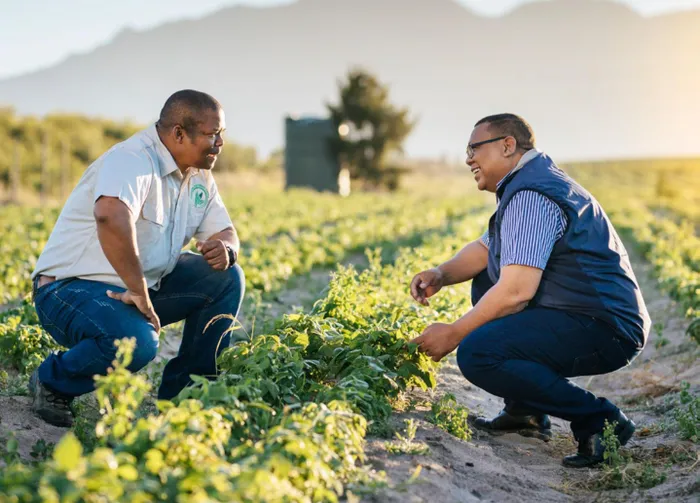Hard work and the right training put Stellenbosch farmer on a growth trajectory

Farmer Sydney Claassen
Image: Staff reporter

Farmer Sydney and Barend
Image: Staff reporter
Being a successful farmer is about much more than having green fingers or putting in long, hard hours to produce a crop.
For a farming operation to be successful, it has to turn a profit. Otherwise, staff cannot be paid, there can be no investments in productivity-improving technology, and ultimately food security suffers.
For Sydney Claassen, a vegetable farmer from Lynedoch near Stellenbosch, and supplier of green beans, baby marrows and leafy greens to one of South Africa’s top retailers, the mark of success is ultimately to balance the three-way relationship between your suppliers, your clients and your on-farm operations.
Since graduating from the KAL Academy in 2017, Sydney’s farming operation has gone from strength to strength. He is a popular host of farmers’ days where he shares production and business insights gleaned from the medium scale farming operation he runs on his family farm.
For Sydney, who left the financial security of civil service behind to start his farming operation in 2015, the expertise and relationships flowing from attending the KAL Academy have been instrumental in putting his business on a growth trajectory.
“Starting out as a small-scale farmer is not easy. Obtaining access to credit to fund the inputs you need to produce a crop is challenging. You may have land and water, but you will have a hard time convincing a seed company to advance you the seed you require before planting and then pay them with the proceeds of your crop, as is the case with many large-scale commercial farming operations.
“It is also difficult for small-scale farmers to gain access to markets. For your business to grow, you need offtake agreements with buyers; the moment you plant a seed, you have to have someone who will buy that product when you harvest it.”
The stakes are high – with an offtake agreement in place, a farmer is obliged to produce enough to satisfy that agreem
ent, otherwise there is a risk that that agreement and the attendant guaranteed income will be lost. Without an offtake agreement, however, a farmer risks borrowing money or spending their savings on inputs to raise a crop that may spoil before a buyer for the produce can be found.
“You need good backing and support; you need encouragement and inspiration from other farmers, and a good relationship with your neighbours,” says Sydney, and for that, the KAL Academy was instrumental.
He came to know of the KAL Academy through an existing business relationship with KAL Group which established the academy in 2008.
“Having KAL Group as a supplier is advantageous for any farming enterprise because of the expertise and support it offers,” he says.
The KAL Academy provides NQF-accredited theoretical and practical training to an average of 20–25 emerging farmers each year, with all costs covered by the KAL Group.
“I did both the plant production and mixed farming (crops and livestock) modules. They were very good interventions. The training affords you the opportunity not only to learn valuable theory, but also to visit commercial farms and see how things are done there" says Sydney.
“Those visits afford you experience that you can bring back to your own farm to apply there. The knowledge about technology such as irrigation systems and types of fertilisers, the contacts with commercial farmers and the technical support and advice from both commercial farmers and your fellow-students – these aren’t things you would necessarily be able to obtain otherwise.”
Sydney’s advice to aspiring small-scale farmers and those starting out, is to get good at one crop rather than over-extending themselves.
“As small-scale farmers, we sometimes want to plant five different crops, but that means you must follow five different crop protection programmes and five different production practices, and you cannot afford this on small scale.
“A better approach is to plant one product that you can do very well. Later, you can pursue a second product. While doing this you can establish a good crop protection programme and rehabilitate your soil to ensure future production.”
Sydney says producing a smaller number of commodities makes it easier to manage all the variables of producing and marketing these crops. It also enables you to produce sufficient quantities to enable you to secure a reliable market for those products.
“When you do one or two products well, it won’t be long before the right buyers start knocking on your door.”
As far as negotiations with buyers are concerned, he says, “No buyer will enter an agreement with you based purely on goodwill. You must prove yourself capable of delivering what they need. You cannot expect handouts; you must be willing to invest your own money in your business, because that shows that you are committed to your own success and to that of your partners.”
Sydney’s journey from a civil servant to a thriving commercial farmer is a testament to the power of hard work, the right training, and industry support.